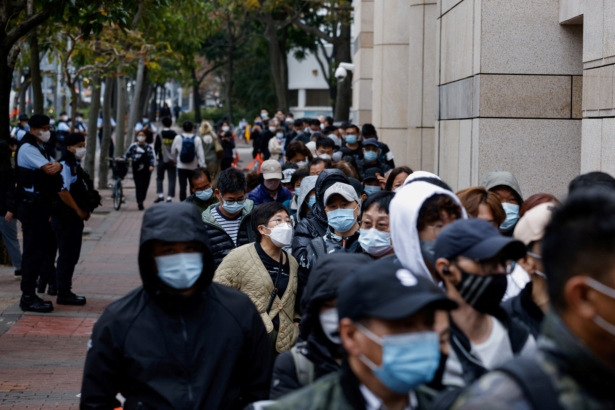HONG KONG—The much-anticipated trial of 16 Hong Kong democracy activists charged under a national security law imposed by Beijing began on Monday with security tight for a case that some observers say will be a test of the city’s judicial independence.
The defendants are those who pleaded not guilty out of 47 arrested in a dawn raid in January 2021 and charged with conspiracy to commit subversion for participating in an unofficial primary election organized by democracy supporters in 2020.
More than 100 people queued for seats in the court’s public gallery with dozens of police on standby and a bomb disposal vehicle deployed.

“There’s no crime to answer. It is not a crime to act against a totalitarian regime,” defendant and former lawmaker Leung Kwok-hung, known by the nickname “Long Hair,” told the court.
Judge Andrew Chan responded that the hearing was a “solemn occasion” and asked for respect from the defendants and members of the public.
Among the 16 are former journalist Gwyneth Ho, activist Owen Chow and labor unionist Winnie Yu.
The trial is expected to last 90 days, with four out of the 47 who were arrested more than two years ago set to testify against the 16, prosecutor Jonathan Man told the court. The defendants face sentences of up to life in jail if convicted.
Prosecutor Jonathan Man identified the four he said would testify against their old colleagues as former legislator Au Nok Hin, former district councilors Andrew Chiu and Ben Chung, and businessman Mike Lam.
Those who pleaded guilty, including former law professor Benny Tai and the prominent young activist Joshua Wong, will be sentenced after the trial.
International Criticism
The then-British colony was returned to Chinese rule in 1997 under a “one country, two systems” formula meant to guarantee its freedoms and an independent legal system for 50 years.
The Chinese regime denies interfering with the city’s way of life but some Hong Kong residents over the years criticized what they saw as the erosion of freedoms by an increasingly aggressive Chinese Communist Party (CCP).
Beijing imposed a national security law on the city in 2020 after months of at times violent pro-democracy protests.
Western governments have criticized the law, which punishes subversion, collusion with foreign forces, and terrorism with up to life in prison, as a tool to crush dissent.
Since the law was imposed, more than 230 people have been arrested, including newspaper editors following police raids on media outlets, while labor unions and civil society groups have disbanded.
Thirteen of the 47 arrested were granted bail in 2021, while the other 34—including 10 who pleaded not guilty—have been in pre-trial custody.
The case has drawn international criticism, as government prosecutors repeatedly asked for more time to prepare legal documents and gather evidence.
Among a number of departures from established common law procedures, Secretary for Justice Paul Lam declined to let the defendants face a jury trial. It is being heard by three High Court judges designated under the national security law: Andrew Chan, Alex Lee, and Johnny Chan.
